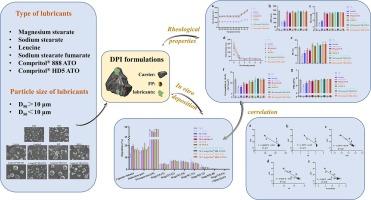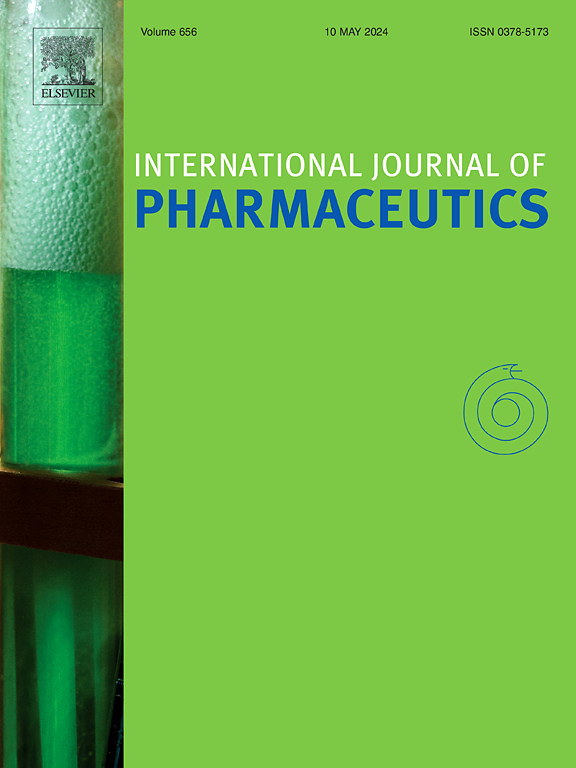Effect of lubricants type and particle size on the rheological properties and aerosolization behavior of dry powder inhalers
IF 5.3
2区 医学
Q1 PHARMACOLOGY & PHARMACY
引用次数: 0
Abstract
A commonly used strategy to improve aerosolization behavior of carrier-based dry powder inhalers (DPIs) is the addition of magnesium stearate as a lubricant, yet it may also negatively affect properties of DPIs. Thus, the aim of this study was to find lubricants that could be used as alternatives of magnesium stearate and meanwhile verify the applicability of using powder rheological properties to predict the performance of different lubricants in DPIs. Here, using fluticasone propionate as a model drug, LH200 as the carrier, influence of lubricants type and particle size, including magnesium stearate, sodium stearate, Leucine, sodium stearate fumarate, Compritol® 888 ATO, and Compritol® HD5 ATO, on the physicochemical properties, powder rheology and aerosolization behavior of the DPI formulations was characterized. Further, the relationship between powder rheological parameters and in-vitro drug deposition parameter, fine particle fraction (FPF), were explored, and the contribution of powder flowability and adhesion was evaluated using principal component analysis (PCA). The results showed that magnesium stearate, sodium stearate and smaller sized leucine significantly reduced the basic flowability energy, aeration energy and Permeability of the DPI formulations, leading to improved aerosolization behavior. A robust linear correlation was established between rheological parameters and FPF. PCA showed that in lubricants containing formulations, the contribution of flowability (74.69%) was greater than that of adhesion (25.31%). In conclusion, sodium stearate and smaller particle size Leucine can be considered as substitutes of magnesium stearate in DPI formulations.

润滑剂类型和粒度对干粉吸入器流变特性和气溶胶行为的影响
改善载体型干粉吸入器(DPI)气溶胶行为的常用策略是添加硬脂酸镁作为润滑剂,但它也可能对 DPI 的性能产生负面影响。因此,本研究旨在寻找可用作硬脂酸镁替代品的润滑剂,同时验证使用粉末流变特性来预测不同润滑剂在干粉吸入器中的性能的适用性。本文以丙酸氟替卡松为模型药物,以 LH200 为载体,研究了硬脂酸镁、硬脂酸钠、亮氨酸、富马酸硬酯钠、Comritol® 888 ATO 和 Compritol® HD5 ATO 等润滑剂类型和粒度对 DPI 制剂的理化性质、粉末流变学和气溶胶行为的影响。此外,还探讨了粉末流变学参数与体外药物沉积参数细颗粒分数(FPF)之间的关系,并使用主成分分析法(PCA)评估了粉末流动性和粘附性的贡献。结果表明,硬脂酸镁、硬脂酸钠和较小粒径的亮氨酸可显著降低 DPI 制剂的基本流动性能、曝气能和渗透性,从而改善气溶胶行为。流变参数与 FPF 之间建立了稳健的线性关系。PCA 显示,在含有润滑剂的配方中,流动性(74.69%)的贡献大于粘附性(25.31%)。总之,硬脂酸钠和粒度较小的亮氨酸可被视为硬脂酸镁在干粉吸入剂配方中的替代品。
本文章由计算机程序翻译,如有差异,请以英文原文为准。
求助全文
约1分钟内获得全文
求助全文
来源期刊
CiteScore
10.70
自引率
8.60%
发文量
951
审稿时长
72 days
期刊介绍:
The International Journal of Pharmaceutics is the third most cited journal in the "Pharmacy & Pharmacology" category out of 366 journals, being the true home for pharmaceutical scientists concerned with the physical, chemical and biological properties of devices and delivery systems for drugs, vaccines and biologicals, including their design, manufacture and evaluation. This includes evaluation of the properties of drugs, excipients such as surfactants and polymers and novel materials. The journal has special sections on pharmaceutical nanotechnology and personalized medicines, and publishes research papers, reviews, commentaries and letters to the editor as well as special issues.

 求助内容:
求助内容: 应助结果提醒方式:
应助结果提醒方式:


